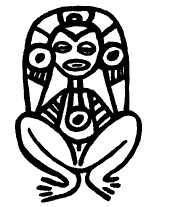Atabeyra: Supreme Taíno Goddess

Huracán was the supreme Taíno god, said Mr. Colón, my history teacher.
As a ten-year-old student, I did not control my enthusiasm:
No, I replied, it was Atabeyra.
What! Mr. Colón shouted, as he hit his desk with a ruler.
Silence crept into the room like a mouse during siesta time.
Every child in class seemed to stop breathing. Suddenly, I felt my face turning red.
Ruler in hand, Mr. Colón slowly walked toward my seat: What, he repeated as he reached me.
My grandmother Petra says that Atabeyra is ---
Wrong, very wrong, Mr. Colón interrupted me, his voice roaring like a hurricane.
First, you need to raise your hand to ask permission to speak, Mr. Colón said. Then, he placed the ruler in front of my face.
Second, he continued, I am the authority on the Taínos, the Indians from Puerto Rico.
My stomach revolted. I felt dizzy. My eyes filled up with tears.
When I got home that day, I told Abuela Petra what happened at school.
Hijita, don't worry, my paternal grandmother consoled me. Your teacher denied our history. Abuela held my face in her hands and said: Mr. Colón forgot our tradition. In doing so, he remains a slave.
What do you mean?
Mr. Colón does not honor Atabeyra as our supreme deity. Abuela looked into my eyes and said: Don't forget who you really are.
A healer and a psychic, Abuela Petra was a fervent devotee of the Divine Feminine. She taught her only granddaughter what she called the mysteries of the goddess:
Our divine mother, Atabeyra is known by many names. As Atabey, Atabei, and Atabex--she is an earth goddess--the Mother of Waters, goddess of the moon, fertility, and childbirth. In her Guabancex aspect, she is the goddess of hurricanes. Atabeyra is the Mother of All Creation. She gave birth to Yocahu, the god of yucca, through immaculate conception.
My grandmother pulled out a Virgin Mary escapulario (scapular) from her ample chest. She placed it in my hands and said:
You see, Atabeyra and the Mother of God are the same.
I promised myself to always remember Atabeyra. Growing up in Borinken (Puerto Rico's indigenous name) made it easy to remember tradition. Most of the island towns have Taíno names such as Arecibo, Caguas, Humacao, Jayuya, Maunabo, Mayaguez, Utuado, and Yabucoa, --to name a few.
Even more important, I learned from my grandmother how to listen to Taíno spirits.

Many years passed since my incident with Mr. Colón. Life went on, as they say. I moved to the continental United States to study psychology. During this education I learned to honor science, unfortunately, at the expense of tradition. Unbeknown to me, I became deaf to Taíno voices. Simply put, I forgot who I really was.
One day, during a hot summer afternoon, I was witnessing a client's bereavement story. Luisa, a young Puerto Rican woman, was describing her grandmother's funeral in Utuado, Puerto Rico. Born and raised in the continental United States, Luisa had never visited Utuado, her grandmother's birthplace,---until now.
In the midst of grief, peace emerged, Luisa said. There was so much love, so much beauty.
Tears began to flow from Luisa's brown, almond-shaped eyes. I reached out to her and offered a box of Kleenex.
This is strange, Luisa said, as she accepted the box. I feel sad and happy. Luisa took a tissue out of the box. I went to this magical place outside Utuado.
Can you tell me more? I asked.
Luisa dried her tears and said: Abuela asked me to visit La Mujer de Caguana when she got sick. I kept my promise and went to Caguana after Abuela's funeral. Luisa looked into my eyes:
Have you been to Caguana?
Like a rooster's cry at sunrise, a lost memory ripped through my mind:
Caguana Indigenous Ceremonial Park is considered one of the most important archeological sites in the West Indies. Located near the Cemí Mountain in Utuado, Caguana is a sacred place. Taínos believed that their goddesses and gods lived in the Cemí Mountain, a sort of indigenous Mount Olympus. Caguana is full of petroglyphs and monumental stones carved with figures representing a crouching human figure giving birth.
Luisa interrupted my reminiscence:
Do you know who La Mujer de Caguana is? she asked, as he moved forward in her chair.
At that moment, I saw a tattoo on Luisa's left leg: A crouching human female giving birth.
Luisa noticed me staring at her tattoo.
Do you know Atabeyra?
Yes, I said, after a long pause. She is--
Our Divine Mother, Luisa finished my sentence.
At that precise moment, I heard Abuela Petra's voice:
Don't forget who you really are.
Photography: Frederick Jacobsen
Comments
-
Please login first in order for you to submit comments

















Ms. Comas,
Thanks for sharing this! Your grandmother did a great service to the gods, and all her people.